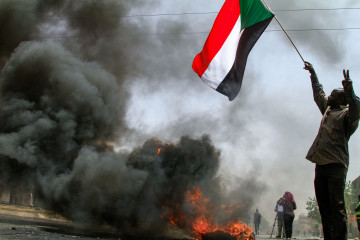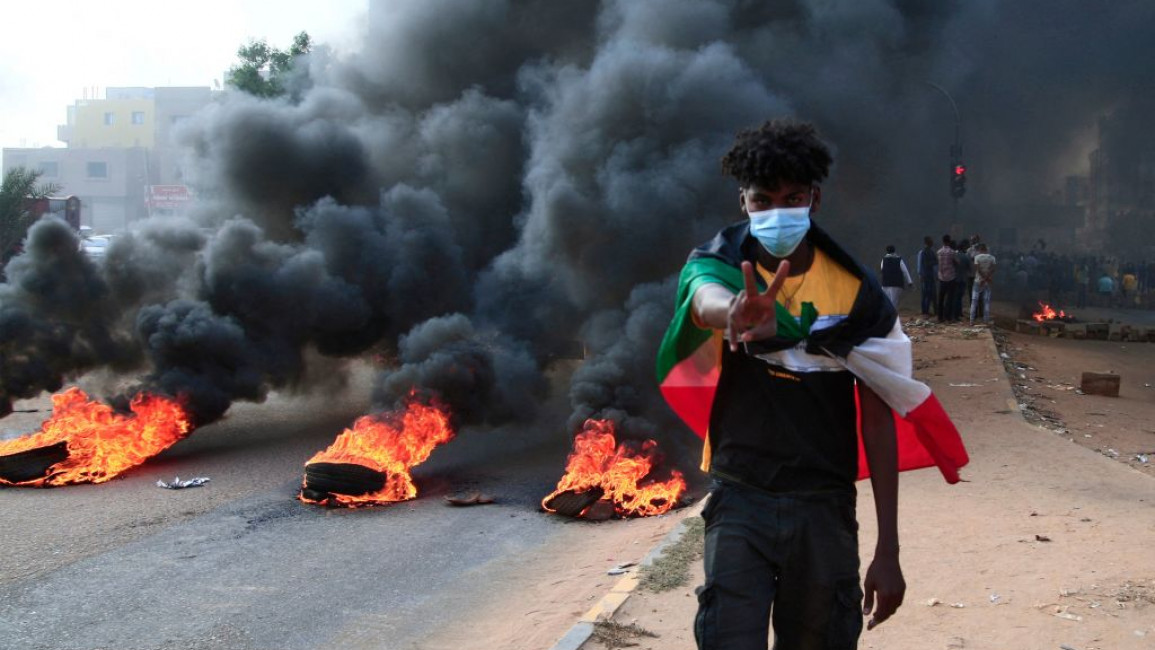

After staging a coup on 25 October 2021, Sudan’s junta has intensified violence against the country’s sprawling pro-democracy movement. Protesters have been killed, abducted, and raped, while international attempts to restore the country’s democratic transition remain woefully ineffective.
Still, hundreds of thousands of Sudanese people continue to reaffirm their demand for full civilian rule. Leading the charge are the resistance committees – neighbourhood groups with their own locally elected representatives – who have coordinated nationwide demonstrations on a nearly weekly basis since the coup.
The sustained protests have kept hopes of democracy alive, but at a significant human cost. According to Sudan’s Central Committee of Doctors, 94 people have been killed in anti-coup protests, often by live ammunition. Countless others have been injured.
Dania Atabani, the spokesperson for a resistance committee in the capital Khartoum, told The New Arab that she nearly lost two of her closest friends after they were hit in the head with a tear gas canister, leaving one with a cracked skull and the other with a lifelong speech impediment.
"The sustained protests have kept hopes of democracy alive, but at a significant human cost"
The violence, she said, is proof that the putschists are deploying the same brutal tactics that they used under former dictator Omar al-Bashir, who ruled Sudan for three decades until he was finally toppled by popular uprisings in April 2019.
“[Security forces] learned all sorts of violence from their [old] master,” Atabani said. “We the Sudanese people have long known the mentality of [the security forces]. We knew that they would try to terrify us by killing us, using sexual violence, and detaining us.”
Targeting activists
Two months after the coup, Sudan’s military commander and coup leader Abdel Fattah al-Burhan restored the arrest powers of the Intelligence Service – one of the most feared security agencies under Bashir – and granted government forces total impunity.
The move resulted in a sharp uptick in arrests and enforced disappearances, according to the Emergency Lawyers, a Sudanese advocacy group providing legal assistance to detainee families. In many cases, security officers have stormed the homes of activists and protesters to abduct them, before taking them to incommunicado detention facilities.
|
|
That’s where Sudan’s Central Investigation Department (CID) interrogates and even tortures activists into giving information about their peers in the resistance committees, according to Mohamad Osman, a researcher on Sudan for Human Rights Watch (HRW).
Osman added that detainees are often threatened with grave charges such as murdering a military corporal or police officer if they don’t cooperate.
“The interrogations have little to do [with] the accusations,” he told The New Arab. “But what’s clear is that the CID seems to now have good data on the resistance committees.”
The putschists are also trying to punish human rights defenders who are monitoring abuses across the country. The case of Sulaima Ishaq, who heads the Combatting Violence Against Women’s Unit (CVAW), which is under the ministry of social affairs, has particularly sparked wide condemnation among the global community.
On 7 April, Ishaq was interrogated by government authorities about “leaking state secrets”. Her alleged crime was reporting the rape of 16 female protesters to the UN Special Representative for Sudan Volker Perthes, who cited Ishaq’s unit as a source in the Security Council the week before.
“It’s normal to have this sort of information shared between the UN and our unit because we are a coordinating mechanism between the UN and the government,” Ishaq told The New Arab.
Ishaq added that the use of rape to target women protesters had already been widely reported, yet the pustchists appeared to be more sensitive to information that was directly cited to the Security Council.
Kholood Khair, a Sudanese expert heading the Khartoum based think-tank Insight Strategy Partners, explained that the putschists have always been suspicious of human rights monitors ever since the International Criminal Court indicted Bashir in 2009 and 2010 for committing crimes against humanity, war crimes, and even genocide in the western province of Darfur.
What’s more, Ishaq is a civil-servant, which lends her allegations more credibility in the eyes of western diplomats, Khair explained.
“It fits into this whole don’t air out your dirty laundry sort of thing,” she told The New Arab.
"The resistance committees outright rejected the deal, which they saw as a blatant attempt to legitimise a military coup, and asserted their demand for full civilian rule"
Failed international response
On 21 November, after nearly a month of protests, the military restored Prime Minister Abdallah Hamdok – who was under house arrest – to his post and agreed to allow him form a technocratic government ahead of elections.
Both Hamdok and Burhan were conscious of needing to stitch together a civilian cabinet to restore billions of dollars in debt-relief and development assistance, which was frozen by international donors in response to the coup.
The agreement was supported by the UK, US and Norway – known as the troika – along with the European Union, Switzerland and Canada. However, the resistance committees outright rejected the deal, which they saw as a blatant attempt to legitimise a military coup, and asserted their demand for full civilian rule.
Their defiance prompted UN Secretary Antonio Guterres to make an “appeal for common sense” to Sudanese protesters. “I think calling into question this particular solution – even if I do understand why people are outraged – would be very dangerous for Sudan,” he said in a press conference on 1 December.
Like his boss, Perthes also backed the deal. But as experts and protesters warned, the agreement collapsed due to mounting unrest and bloodshed on the streets, which compelled Hamdok to step down on 2 January.
Six days later, Perthes announced the beginning of what he described as a Sudanese-led consultation process, which would see him meet with the putschists separately, and with a number of civilian ‘stakeholders’ in hopes of trying to rally together a new civilian bloc.
But Perthes efforts have so far failed to win the trust of the pro-democracy movement. Despite extending invitations to Khartoum resistance committees, not a single one from the capital attended the first phase of the closed-door consultations, according to the UN’s own summary of its initiative.
Just weeks before the consultations were announced, some committees had expressed an openness to consult with Perthes if talks were broadcasted. Through insisting on transparency, the resistance committees hoped to avoid any suspicion that they were betraying the popular demands of the pro-democracy movement, which refused to negotiate, legitimise, or partner with the military.
But in a conversation with the author in February, Perthes said that he was not willing to broadcast talks, nor alter the structure of the consultations to win the confidence of the resistance committees.
"Human rights activists, analysts, and protesters also warned that the junta would simply exploit the UN process to buy time to consolidate power, which is exactly what they have done"
He added that he would be willing to organise a public event, but separately from the structure of the consultations, a process backed by the international community. “We give the same structure to all the consultees and everybody that comes to my table,” he said.
Human rights activists, analysts, and protesters also warned that the junta would simply exploit the UN process to buy time to consolidate power, which is exactly what they have done. Since the coup, a number of personalities from the former regime have been released from prison and subsumed into state ministries and the security services.
Jihad Mashamoun, a Sudanese political analyst based in the UK, told The New Arab that the global community must re-engage with Sudan through actively consulting and supporting the pro-democracy movement, rather than simply outsource responsibility to a toothless UN mission. Just last month, al-Burhan threatened to kick Perthes out of the country.
Mashamoun added that world powers should apply more pressure on the junta to prompt them to cooperate, such as imposing targeted sanctions on their illicit gold operations.
“[The military] still believes that through dragging out this negotiation process, the global community will eventually give up,” he said. “Targeted sanctions are the only way forward.”
Mat Nashed is a Lebanon-based journalist covering displacement and exile.
Follow him on Twitter: @matnashed





 Follow the Middle East's top stories in English at The New Arab on Google News
Follow the Middle East's top stories in English at The New Arab on Google News


